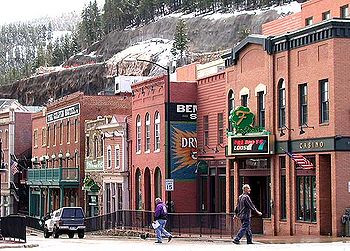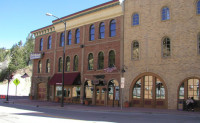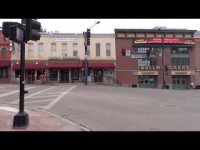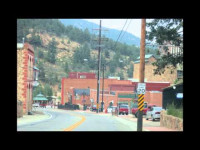Colorado Casinos
Average Rating 3.5 / 5
Top Rated Online Casinos for Colorado
up to
test
Sort By
Casino is closed



200,00$
-
800,00$
About Colorado Gaming
UPDATE: Casinos are now all allowed to be open 24 hours and bet limits have been raised from $5 to $100 max bet.
Colorado voters passed a bill to legalize limited stakes gambling in 1991. Limited stakes means maximum bet is $100. You must be 21 to gamble in the state of Colorado. The gambling bill was initially passed under the idea that gaming would revive and "protect" the three National Historic Districts that were allowed to open casinos.
Colorado also has a state lottery, current lotto results can be found here: Colorado lottery results
Colorado Casinos & Gambling
Colorado legalized gambling casinos in three towns in 1991. The towns are Black Hawk, Central City & Cripple Creek. However there are also two Native American Indian Casinos as well. These casinos don't have to follow the Colorado gaming code exactly but only vary in the fact that the Colorado Indian casinos are open 24 hours a day where as the casinos in the three gambling towns have to shut the doors at 2:00 a.m. every morning.
Black Hawk is the largest of the casino towns in Colorado (for now), and Cripple Creek is second in gaming revenue. Central City the first to get big and the smallest of the casino towns at this point is on a comeback however with a new exit directy off I-70 near Idaho Springs, Colorado that shaves quite a bit of time off the gamblers drive from Denver.
Central City seems to have a bit more of its history preserved and Black Hawk seems to be a bit more glitzy of a casino city and more like Vegas (although no real comparison here, obviously). Cripple Creek Casinos are right in the middle. They still have the old west appeal but there are large casinos available here, too. Central City is home to Fortune Valley Hotel & Casino also one of the larger casinos in Colorado.
Colorado is also rich in history and environmental texture, from cosmopolitan cities like Denver or Vail to smaller municipalities, get outside for fresh air appeal to every Colorado activity. It is a state famous for its world class skiing and bike-laden residents going to and from their various destinations.
The residents of the state of Colorado also love the casinos as do the many annual gambling tourist and visitors. Many of the Colorado casinos dotting the state are run by Native American tribes, which offer a perfect day indoors out of the often harsh weather conditions.
There are numerous small-scale casinos around the state as well as the larger casinos. Most of the casinos feature slot machines in the hundreds, various table games and a host of amenities. Plentiful at most Colorado casinos are the dining facilities, with restaurants offering delectable specialties for casino guests. Colorado casinos offer a variety of entertainment and fun for those who love to gamble, whether professionally or otherwise. Colorado offers something for everyone even if they are looking for something unusual and interesting to do in their spare time.
Colorado Casino Information

Colorado has 38 casinos in which you'll find more than 15,606 slots and gaming machines. There are a total of 234 table games. The minimum bet we've found at casinos in Colorado is $0.01 and the maxium bet is $100. Click a casino on the left for more information on a particular property.
If you wish to stay at some nice casino hotels in Colorado, visit the Colorado casino hotels page. We actually have 21 Colorado hotels you can book directly from World Casino Directory. Click here to see a list of all Colorado hotels available.
There is poker in Colorado! You will find over 119 live poker tables to play at. You will find the following games in Colorado casinos: NL Texas Hold'em, Omaha Hi-Lo, Limit Holdem, Texas Hold'em, High Five Poker, Crazy Pineapple, 7 Card Stud, Omaha, Pot Limit Omaha Hi, No Limit Holdem, Spread Limit Hold 'em, Limit Omaha 8 or Better, Spread Limit Omaha 8 or Better. Some Colorado casinos also offer convention centers and meeting spaces. Over the entire town, you will find a total of 46,784 conference sq/ft space in the various casino properties.
Colorado Casinos and Gambling Facts
Colorado Casinos and the Biggest Casino City in Colorado
Colorado has a total of 38 casinos and pari-mutuel facilities at your disposal which are spread out across 7 cities throughout the state. The city with the most is Black Hawk with 16 casinos.

Biggest Casino / Gaming Facility in Colorado
Out of all casinos in Colorado you'll find Ameristar Casino Resort to be the biggest. It has 1513 gaming machines and 25 table games. You can reach South Point Casino by phone at 720-946-4000 or by clicking this link: Ameristar Casino Resort to see its information page.
2nd Biggest Casino / Gaming Facility in Colorado
Coming in second place for largest casino in Colorado is Isle of Capri Hotel Casino with 1080 gaming machines and 18 table games. This casino can be reached by calling 303-998-7777 or by clicking this link: Isle of Capri Hotel Casino to see its information page.
Pari-mutuel
Parimutuel, or Pari-Mutuel, betting is the term used when all of the winning bettors divide the total prize amount amongst themselves. The pari-mutuel facility first takes a percentage of the total winnings to cover facility costs, taxes and other fees. The remainder is split between the winners.
Colorado pari-mutuel betting is implemented on all sporting events with a relatively short duration where those who participate are ranked in order at the finish. Colorado Pari-Mutuels include horse track racing and greyhound racing. The Pari-Mutuel system is also used in Jai Alai betting, which remains very popular in Florida.
What sets Pari-Mutuel betting apart from the standard 'fixed odds' betting system is that the final prize or payout is not established until all betting is closed. At that time, all relative bets are calculated, with the racing facilities percentage subtracted, and the potential winnings per bettor revealed. Fixed odds betting, on the other hand, offers the bettor an agreed upon prize before the wager is ever placed.
Colorado Pari-Mutuel betting is regulated by the state, making it available in many places where such wagering would be otherwise illegal. Off-Track pari-mutuel betting is also provided, allowing bettors to place their pari-mutuel wagers without actually attending the greyhound or horse racing event. Bettors may visit an off-track betting facility to place an off-track wager and a watch simulcast of the event.
Colorado Pari-Mutuel - Payout Structure
Once all bets are closed and the event is set to begin, the racing park will post the actual Payout Structure for each possible outcome. In some cases, the expected payout for each outcome will be posted, meaning this is the payout that would result if no more bets were to be placed. Each time another wager is placed, the expected outcome will be calculated accordingly.
The Payout Structure for a Colorado Pari-Mutuel System is best defined through example. In the following scenario, where the Colorado Pari-mutuel facility keeps a 15% take from all bets, and there are 8 possible Outcomes, the field might look like this:
Outcome 1 – $20.00
Outcome 2 – $50.00
Outcome 3 – $22.00
Outcome 4 – $15.00
Outcome 5 – $36.00
Outcome 6 – $120.00
Outcome 7 – $70.00
Outcome 8 – $115.00
The total pool becomes $448, the sum of all possible wagers. Bettors who wager on the first outcome must place bets of, or in increments of, $20. A $40 bet would constitute 2 bets. Once the event begins, no more bets are taken. The event begins and Outcome 1 is the winner. Now the Payout will be calculated. First the house take is removed (15% of $448 = $67.20... $448 - $67.20 = $380.80). The remainder ($380.80) is split between those who wagered on the winning outcome - Outcome 1 ($380.80 / $20 = $19.04). The $.04 is normally rounded to the nearest $.10, making it $19.00 even. The facility usually adds the leftover to the house take. Each winning bettor will now receive $19.00 for every $1 wagered, creating a payout of '19 to 1'. Thus a bet on Outcome 1 would pay $360 per wager (19 x $20 = $360).
Colorado Pari-Mutuel - Greyhound & Horse Racing Facilities
Colorado Pari-Mutuel betting facilities are found throughout the state. The following is a list of all Colorado Pari-Mutuel greyhound racing and horse racing facilities, followed by their location, business phone and racing results phone numbers.
Arapahoe Park & Racetrack
26000 E. Quincy Avenue
Aurora, Colorado 80016
Phone# (303) 690-2400
Race Results# (303) 227-4726
Mile High Greyhound Racing
6200 Dahlia
Commerce City, CO 80022
Phone# (303) 288-1591
Fax# (303) 289-1640
Race Results# (303) 227-4726
Mile High Event Center
(Directly across the street from Mile High Greyhound Racing)
5155 E. 64th Ave
Commerce City, CO 80022
Phone# (303) 288-1591
Fax# (303) 289-1640
Post Time Greyhound Park
3701 N. Nevada Avenue
Colorado Springs, CO 80907
Phone# (719) 632-1391
Fax# (719) 632-1792
Pueblo Greyhound Park
6200 Dahlia
Commerce City, CO 80022 Phone: (303) 288-1591
FAX# (303) 289-1640
Race Results# (303) 288-1555
The Reserve of Cherry Creek
351 South Jackson Street
Denver, Colorado 80209
Phone# (303) 355-1231
Fax# (303) 355-5126
Colorado Pari-Mutuel - Off-Track Betting Facilities
Havana Park Off Track Betting
10750 E. Iliff Avenue
Aurora, CO 80014
Phone# (303) 696-7315
Fax# (303) 696-7206
Red & Jerry's
1840 W. Oxford Ave
Sheridan, CO 80110
Phone# (303) 783-0655
Fax# (303) 783-9724
Gambling History
According to popular belief, though argued by some, Brown's Saloon was the first casino built on American Soil in 1822. The saloon was built upon the intersecting corners of Colorado, Wyoming and Utah.
Trappers in the west greatly enjoyed the casino gambling and those passing through quickly spread the idea further west. Gold miners were constantly traversing the plains in search of wealth towards the Pacific Coast. Inevitably, casinos were developed in abundance in an attempt to capture what gold these prospectors may have found.
American laws fluctuated, making gambling illegal, much to the pleasure of the Puritan folk. As the years went on, legalized gambling gathered more support, and various states began accepting the development of state regulated casinos.
Colorado gambling enthusiasts were greatly pleased in November of 1990 when Casino operators made their way into Colorado. Voters supported the legislation to legalize casino gambling in Colorado, and in 1991 the law was officially passed. The guidelines came along with a limited stakes rule, holding all bets to a maximum of $5, and an 'adult only' law requiring Colorado casino gamblers to be at least 21 years of age.
Colorado state government legalized casino gambling in three towns - Black Hawk, Central City and Cripple Creek. Each of these towns are considered National Historic Districts. The purpose of this legislation was to preserve the history of these towns.
Colorado casino gamblers will also find two Native American Indian casinos - the Sky Ute Casino in Ignacio, Colorado and the Ute Mountain Casino in Towaoc, Colorado. These casinos are not required to follow the same legalized gambling codes, but the only variable in their operation is the hours of operations. Colorado gambling establishments are required by law to close their doors no later than 2:00am, while the Native American Indian casinos in Colorado may stay open 24 hours a day.
The city of Black Hawk is currently the largest Colorado gambling local in regards to casino gambling revenue, followed by Cripple Creek. Though Central City maintains the largest amount of casino gambling facilities, their unfortunate location has derived the smallest revenue.
Gamblers from Denver Colorado traveling toward Central City will find Black Hawk first, along the route, therefore making it more convenient to place their wagers at Colorado's Black Hawk casinos. For this reason, Black Hawk has acquired the highest revenue in Colorado casino gambling, amongst the three towns. In an effort to increase revenue and compete with Black Hawk's significant casino gambling business, Central City has financed an exit directly off Interstate-70 near Idaho Springs. The 4-lane Central City Parkway exit would give travelers substantially less driving time to reach Central City's Colorado Casinos, while at the same time taking them off the path to Black Hack.
Another draw for gamblers to visit Colorado's Central City Casinos is the true preservation of national history. Black Hawk's Colorado Casinos, on the other hand, have opted for a more glamorous style, constructing their casinos with a glitzy style more akin to Las Vegas. Cripple Creek is considered to be the middle-man in regards to development, straying more from the historical aspect than Central City, yet avoiding the lights and flamboyance of Black Hawk Casinos.
Central City boasts the largest casino in the history of Colorado gambling - Fortune Valley Hotel & Casino. This vast Colorado gambling attraction is home to 8 live BlackJack tables, 7 live poker tables and 1,008 slot machines, including $0.05-$5.00 Progressive Video Poker machines with both in-house and statewide progressive jackpots. The Fortune Valley Hotel offers 118 rooms and luxuriously decorated suites.
Residents of Colorado frequent the casino gambling facilities, but being a major hot spot for tourists, especially those who come to ski the majestic slopes of the Rockies, Colorado gambling revenue is significantly increased by those vacationing in the mile-high state.
Many smaller Colorado gambling casinos can be found throughout the state, offering a large assortment of slot machines and casino table games. A large number of tourists seeking to avoid the large crowds and high prices discover the amenities and excitement of these smaller Colorado gambling casinos and hotels to be well worth finding.
The popularity Colorado's Casino gambling has soared since it's legalization in 1991. The first two months of the fiscal 2007-2008 year reported Colorado casino gambling revenue at $148-million.
Bingo
The history of Bingo in Colorado was first documented as Pastor Charles H. Hagus launched a bingo game to support and raise funds for their church, called The Annunciation, in northeast Denver. The church had undergone decades of funding issues, forced to offer Catholic schooling in a decrepit, abandoned schoolhouse they had leased for $50/month.
When Colorado passed a law to legalize charity Bingo in 1950, Hagus immediately started up Bingo Night, where players from the community gathered at the old Greek Orthodox Church on Lafayette street.
His idea was so successful that the Annunciation was able to purchase the old Greek Orthodox Church and move their organization to the new building, which was renamed Hagus Hall.
Assistant pastor Charles B. Woodrich, a former advertising specialist in New York City, brought further success to the Hagus Hall Bingo games. Knowing the quality and overall excitement of the game would have everything to do with the fruition of the venture, he went on a trip to Las Vegas. In an interview, Father Woodrich stated that his intention was ""to learn how to professionally stage bingo extravaganzas."
Unfortunately, this historic landmark in Colorado's Bingo history no longer exists. Hagus Hall was demolished in 1986 to make way for local HUD townhomes.
Colorado Bingo - Fun Bingo Facts
Everyone knows (or should know) the basic, historical facts of Bingo. The fun bingo facts listed below, associated with modern day and history of Bingo in Colorado, are interesting tid-bits you probably didn't know:
1. 10% of women love to play Bingo.
2. 5% of men love to play Bingo.
3. 7.5% of the entire population loves to play Bingo (as you may have surmised from Bingo fun-fact 1 and 2 ;)
4. Approximately 30% of all bingo players are under 35 years of age.
4. The average game of Bingo lasts 3 to 6 minutes.
5. Winning claim verification averages 30 seconds.
6. Professional Bingo callers average 23 numbers per minute.
7. Famous celebrities love playing Bingo! Some of the more notable celebrities who love a good game of Bingo include Kelly Ripa (Live with Regis and Kelly), Sharon Osbourne (wife of Ozzy's Osbourne), Bono (lead singer of U2) and Catherine Zeta-Jones (Academy Award winning actress).
8. Human Bingo is a popular social game used to introduce people in a group setting, also used in many schools at the start of the school year to help children get to know one another.
9. Between 1911 and 2007, 42 movies have been produced with the word 'Bingo' in the title, 10 of which were simply named 'Bingo'.
10. The first film with Bingo in the title, The Bully of Bingo Gulch [1911], was based in Colorado.
11. Famous playwright and actress June Carryl (born June Lemona), star of the 1999 film 'King of the Bingo Game', grew up in Denver Colorado.
12. There are more than 60 official Bingo Halls in the state of Colorado.
13. Bingo is the main source of 'community fundraising' in North America.
14. There are 552,446,474,061,128,648,601,600,000 possible bingo card combinations, according to one calculation, (which may or may not be correct - I'm certainly not going to take the time to find out!) That translates to: "five hundred fifty-two septillion, four hundred forty-six sextillion, four hundred seventy-four quintillion, sixty-one quadrillion, one hundred twenty-eight trillion, six hundred forty-eight billion, six hundred one million, six hundred thousand" different bingo cards.
Gambling Law
Colorado has legal low-stakes gaming in certain smaller, historical cities. Gaming operations in those cities are licensed and regulated by the Colorado Gaming Commission.
Colorado also permits recognized charities to hold bingos and raffles under the restrictive conditions set forth in its Bingos and Raffles Law, C.R.S. 12-9-101. Participating charities are required to secure a license from the Colorado Secretary of State's licensing center.
The following statutes cover gambling that is not licensed and regulated.
18-1-603. Complicity.
A person is legally accountable as principal for the behavior of another constituting a criminal offense if, with the intent to promote or facilitate the commission of the offense, he or she aids, abets, advises, or encourages the other person in planning or committing the offense.
Gambling Sections
18-10-101. Legislative declaration - construction.
(1) It is declared to be the policy of the general assembly, recognizing the close relationship between professional gambling and other organized crime, to restrain all persons from seeking profit from gambling activities in this state; to restrain all persons from patronizing such activities when conducted for the profit of any person; to safeguard the public against the evils induced by common gamblers and common gambling houses; and at the same time to preserve the freedom of the press and to avoid restricting participation by individuals in sport and social pastimes which are not for profit, do not affect the public, and do not breach the peace.
(2) All the provisions of this article shall be liberally construed to achieve these ends and administered and enforced with a view to carrying out the declaration of policy stated in subsection (1) of this section.
18-10-102. Definitions.
As used in this article, unless the context otherwise requires:
(1) "Gain" means the direct realization of winnings; "profit" means any other realized or unrealized benefit, direct or indirect, including without limitation benefits from proprietorship, management, or unequal advantage in a series of transactions.
(2) "Gambling" means risking any money, credit, deposit, or other thing of value for gain contingent in whole or in part upon lot, chance, the operation of a gambling device, or the happening or outcome of an event, including a sporting event, over which the person taking a risk has no control, but does not include:
(a) Bona fide contests of skill, speed, strength, or endurance in which awards are made only to entrants or the owners of entries;
(b) Bona fide business transactions which are valid under the law of contracts;
(c) Other acts or transactions now or hereafter expressly authorized by law;
(d) Any game, wager, or transaction which is incidental to a bona fide social relationship, is participated in by natural persons only, and in which no person is participating, directly or indirectly, in professional gambling; or
(e) Repealed.
(f) Any use of or transaction involving a crane game, as defined in section 12-47.1-103 (5.5), C.R.S.
(3) "Gambling device" means any device, machine, paraphernalia, or equipment that is used or usable in the playing phases of any professional gambling activity, whether that activity consists of gambling between persons or gambling by a person involving the playing of a machine; except that the term does not include a crane game, as defined in section 12-47.1-103 (5.5), C.R.S.
(4) "Gambling information" means a communication with respect to any wager made in the course of, and any information intended to be used for, professional gambling. In the application of this definition the following shall be presumed to be intended for use in professional gambling: Information as to wagers, betting odds, or changes in betting odds. Legitimate news reporting of an event for public dissemination is not gambling information within the meaning of this article.
(5) "Gambling premises" means any building, room, enclosure, vehicle, vessel, or other place, whether open or enclosed, used or intended to be used for professional gambling. In the application of this definition, any place where a gambling device is found is presumed to be intended to be used for professional gambling.
(6) "Gambling proceeds" means all money or other things of value at stake or displayed in or in connection with professional gambling.
(7) "Gambling record" means any record, receipt, ticket, certificate, token, slip, or notation given, made, used, or intended to be used in connection with professional gambling.
(8) "Professional gambling" means:
(a) Aiding or inducing another to engage in gambling, with the intent to derive a profit therefrom; or
(b) Participating in gambling and having, other than by virtue of skill or luck, a lesser chance of losing or a greater chance of winning than one or more of the other participants.
(9) "Repeating gambling offender" means any person who is convicted of an offense under section 18-10-103 (2) or sections 18-10-105 to 18-10-107 or sections 12-47.1-809 to 12-47.1-811 or 12-47.1-818 to 12-47.1-832 or 12-47.1-839, C.R.S., or sections 18-20-103 to 18-20-114 within five years after a previous misdemeanor conviction under these sections or a former statute prohibiting gambling activities, or at any time after a previous felony conviction under any of the mentioned sections. A conviction in any jurisdiction of the United States of an offense which, if committed in this state, would be professional gambling shall warrant a prosecution in this state as a repeating gambling offender.
(10) "Vintage slot machine" means any model slot machine, as defined in section 12-47.1-103 (26), C.R.S., that was introduced on the market prior to January 1, 1984.
18-10-103. Gambling - professional gambling - offenses.
(1) A person who engages in gambling commits a class 1 petty offense.
(2) A person who engages in professional gambling commits a class 1 misdemeanor. If he is a repeating gambling offender, it is a class 5 felony.
18-10-104. Gambling devices - gambling records - gambling proceeds.
(1) Except as provided in subsection (2) of this section, all gambling devices, gambling records, and gambling proceeds are subject to seizure by any peace officer and may be confiscated and destroyed by order of a court acquiring jurisdiction. Gambling proceeds shall be forfeited to the state and shall be transmitted by court order to the general fund of the state.
(2) If a gambling device is a vintage slot machine and is not operated for gambling purposes for profit or for business purposes, it shall not be confiscated or destroyed pursuant to subsection (1) of this section. If a gambling device is confiscated and the owner shows that such gambling device is a vintage slot machine and is not used for gambling purposes, the court acquiring jurisdiction shall order such vintage slot machine returned to the person from whom it was confiscated.
18-10-105. Possession of a gambling device or record.
(1) Except as provided in subsection (1.5) of this section, a person who owns, manufactures, sells, transports, possesses, or engages in any transaction designed to affect the ownership, custody, or use of a gambling device or gambling record, knowing that it is to be used in professional gambling, commits possession of a gambling device or record.
(1.5) The sale, transportation, manufacture, and remanufacture of gambling devices, including the acquisition of essential parts therefor and the assembly of such parts, is permitted if such devices are sold, transported, manufactured, and remanufactured only for transportation in interstate or foreign commerce when such transportation is not prohibited by any applicable foreign, state, or federal law. Storage of gambling devices is also permitted but only for purposes of manufacturing, remanufacturing, and transporting such devices in interstate or foreign commerce when their transportation is not prohibited. Such activities may be conducted only by persons who have registered with the United States government pursuant to the provisions of chapter 24 of Title XV of the United States Code, as amended. Such gambling devices shall not be openly displayed, except to legal buyers, or sold for use in Colorado regardless of where purchased, nor manufactured, remanufactured, or stored for purposes of manufacture, remanufacture, and transportation in violation of any applicable state or federal law. For purposes of this subsection (1.5), "legal buyer" means a buyer who resides in another state or country which does not restrict the possession of the specific gambling device in question.
(2) Possession of a gambling device or record or violation of subsection (1.5) of this section is a class 2 misdemeanor. If the offender is a repeating gambling offender, it is a class 6 felony.
18-10-106. Gambling information.
(1) Whoever knowingly transmits or receives gambling information by telephone, telegraph, radio, semaphore, or other means or knowingly installs or maintains equipment for the transmission or receipt of gambling information commits a class 3 misdemeanor. If the offender is a repeating gambling offender, it is a class 6 felony.
(2) Facilities and equipment furnished by a public utility in the regular course of business, and which remain the property of the utility while so furnished, shall not be seized except in connection with an alleged violation of this article by the public utility and shall be forfeited only upon conviction of the public utility therefor.
Sweepstakes Promotions
The Colorado law firm Davis & Gilbert has posted the following conclusion about the State's legislation regulating sweepstakes: "The detailed requirements of Colorado's newest sweepstakes statute show that the Colorado Legislature strongly disapproves of unfair and deceptive tactics by sweepstakes sponsors. Due to the meticulous directives, it is likely that many sponsors will opt to exclude Colorado from direct mail solicitations for the simple reason that preparing a special mailing to comply with Colorado law may be too costly and time-consuming. Sponsors that decide to include Colorado in their sweepstakes are well-advised to be very familiar with the terms of this statute."
Here are the requirements of the statute:
6-1-801. Legislative finding, declaration, and intent.
(1) The general assembly hereby finds, determines, and declares that a vast number of sweepstakes and contests have been and are being directed to Colorado consumers; that Colorado consumers may have paid millions of dollars to purchase goods or services to enter sweepstakes and contests based on representations created by the sponsors of those sweepstakes and contests; that these sweepstakes and contests may be targeted to certain vulnerable Colorado consumers; that there is a compelling need to curtail and prevent the most deceptive practices in connection with the promotion of sweepstakes and contests; that there is a compelling need for more complete disclosure of rules and operation of sweepstakes and contests in which money or other valuable consideration may be solicited; that preventing the deceptive promotions of sweepstakes and contests is a matter vitally affecting the public interest; and, therefore, that statutory regulation of sweepstakes and contests is necessary to the general welfare of the public.
(2) It is the intent of the general assembly to require that Colorado consumers be provided with all relevant information necessary to make an informed decision concerning sweepstakes and contests. It is also the intent of the general assembly to prohibit misleading and deceptive prize promotions. The terms of this part 8 shall be construed liberally in order to achieve this purpose.
6-1-802. Definitions.
As used in this part 8, unless the context otherwise requires:
(1) "Contest " means any game, puzzle, competition, or plan that holds out or offers to prospective participants the opportunity to receive or compete for gifts, prizes, or gratuities as determined by skill or any combination of chance and skill; except that "contest " shall not be construed to include any activity of licensees regulated under article 9 or article 47.1 of title 12, C.R.S., or part 2 of article 35 of title 24, C.R.S.
(2) "No purchase necessary message " means the following statement, set apart and in bold-faced type, and at least ten-point type: "No purchase or payment of any kind is necessary to enter or win this [sweepstakes or contest]."
(3) "Official rules " means the formal printed statement of the rules for the sweepstakes or contest, which statement shall be printed in contrasting type face at least ten-point type.
(4) "Prize " means cash or an item or service of monetary value that is offered or awarded to a person in a real or purported sweepstakes or contest.
(5) "Prize notice " means a written notice, other than an advertisement appearing in a magazine or newspaper of general circulation, delivered by the United States postal service or by a private carrier, that is or contains a representation that the recipient will receive, or may be or may become eligible to receive, a prize.
(6) "Represent " and "representation " includes express statements and the implications and inferences that would be drawn from those statements, taking into account the context in which the representation is made, including, but not limited to, emphasis, font, size, color, location, and presentation of the representation and any qualifying language. If the representation is made on or visible through a mailing envelope, the context in which the representation is to be considered, including any qualifying language, shall be limited to that which is visible without opening the mailing envelope.
(7) "Retail value " of a prize means:
(a) A price at which the sponsor can demonstrate that a substantial number of the prizes or substantially similar items have been sold to the public in this state by someone other than the sponsor during the preceding year; or
(b) If the sponsor is unable to satisfy the requirement in paragraph (a) of this subsection (7), then the retail value is no more than one and one-half times the amount that the sponsor paid or would pay for the prize in a bona fide purchase from a seller unaffiliated with the sponsor.
(8) "Specially selected " means a representation that a person is a winner, a finalist, in first place or tied for first place, or otherwise among a limited group of persons with an enhanced likelihood of receiving a prize.
(9) "Sponsor" means a person who offers, by means of a prize notice, a prize to another person in this state in conjunction with any real or purported sweepstakes or contest that requires or allows, or creates the impression of requiring or allowing, the person to purchase any goods or services or pay any money as a condition of receiving, or in conjunction with allowing the person to receive, use, compete for, or obtain a prize or information about a prize.
(10) "Sweepstakes " means any competition, giveaway, drawing, plan, or other selection process or other enterprise or promotion in which anything of value is awarded to participants by chance or random selection that is not otherwise unlawful under other provisions of law; except that "sweepstakes " shall not be construed to include any activity of licensees regulated under article 9 or article 47.1 of title 12, C.R.S., or part 2 of article 35 of title 24, C.R.S 6-1-803. Prohibited practices and required disclosures.
6-1-803. Prohibited practices and required disclosures.
(1) No sponsor shall require a person to pay the sponsor money or any other consideration as a condition of awarding the person a prize, or as a condition of allowing the person to receive, use, compete for, or obtain a prize or information about a prize.
(2) No sponsor shall represent that a person has won or unconditionally will be the winner of a prize or use language that may lead a person to believe he or she has won a prize, unless all of the following conditions are met:
(a) The person shall be given the prize without obligation;
(b) The person shall be notified at no expense to such person within fifteen days of winning a prize; and
(c) The representation is not false, deceptive, or misleading.
(3) If a sponsor offers one or more items of the same or substantially the same value to all or substantially all of the recipients of a prize notice, the sponsor shall not:
(a) Represent that such items are prizes or that the process by which such items are to be distributed is a sweepstakes or contest, or otherwise represent that such process involves a distribution by chance; or
(b) Represent that the recipient is or has been specially selected unless it is true.
(4) No sponsor shall represent that a person has been specially selected in connection with a sweepstakes or contest unless it is true.
(5) No sponsor shall represent that a person may be or may become a winner of a prize, characterize the person as a possible winner of a prize, or represent that the person will, upon the satisfaction of some condition or the occurrence of some event or other contingency, become the winner of a prize, unless each of the following is clearly and conspicuously disclosed:
(a) The material conditions necessary to make the representation truthful and not misleading, including but not limited to the conditions that must be satisfied in order for the person to be determined as the winner. All such conditions shall be:
(I) Presented in such a manner that they are an integral part of the representation and not separated from the remainder of the representation by intervening words, graphics, colors, or excessive blank space;
(II) Made in terms, syntax, and grammar that are as simple and easy to understand as those used in the representation; and
(III) Presented in such a manner that they appear in the same type size and in the same type face, color, style, and font as the remainder of the representation.
(b) The fact that the person has not yet won;
(c) The no purchase necessary message;
(d) The retail value of each prize;
(e) The estimated odds of receiving each prize pursuant to paragraph (c) of subsection (6) of this section;
(f) The true name or names of the sponsor, the address of the sponsor's actual principal place of business, and the address at which the sponsor may be contacted;
(g) If receipt of a prize is subject to a restriction, a statement that a restriction applies and a description of the restriction;
(h) The deadline for submission of an entry to be eligible to win each prize;
(i) If a sponsor represents that the person is or has been specially selected, and if the representation is not prohibited under subsections (3) and (4) of this section, then immediately adjacent to such representation, in the same type size and boldness as the representation, a statement of the maximum number of persons in the group or purported group of persons with this enhanced likelihood of receiving a prize;
(j) The official rules for the sweepstakes or contest.
(6) Unless otherwise provided by subsection (5) of this section, the information required by subsection (5) of this section shall be presented in the following form:
(a) The information required by paragraphs (b) to (h) of subsection (5) of this section may be presented either:
(I) Immediately adjacent to the first identification of the prize to which it refers and in the same type size and boldness as the reference to the prize; or
(II) In a separate section of official rules with a section entitled "consumer disclosure", which title shall be printed in no less than twelve-point, bold-faced type, which section shall contain only a description of the prize, and which text shall be printed in no less than ten-point type.
(b) In addition to the other requirements of this subsection (6), the no purchase necessary message shall be presented in the official rules and, if the official rules do not appear thereon, on any device by which a person enters a sweepstakes or contest or purchases any goods or services or pays any money in connection with a sweepstakes or contest. The no purchase necessary message included in the official rules shall be set out in a separate paragraph in the official rules and be printed in capital letters in contrasting type face not smaller than the largest type face used in the text of the official rules. If a person is required or allowed to enter the sweepstakes or contest, or purchase any goods or services or pay any money in connection with a sweepstakes or contest, through a telephone call, the no purchase necessary message must be read to the person during the telephone call prior to accepting the entry, purchase, or payment.
(c) The statement of the odds of receiving each prize shall include, for each prize, the total number of prizes to be given away and the estimated odds of winning each prize based upon the following formula: "____ [number of prizes] out of _____ prize notices distributed".
(d) All dollar values shall be stated in Arabic numerals and be preceded by a dollar sign.
(7) No sponsor shall subject sweepstakes or contest entries not accompanied by an order for products or services to any disability or disadvantage in the winner selection process to which an entry accompanied by an order for products or services would not be subject.
(8) No sponsor shall represent that an entry in a sweepstakes or contest accompanied by an order for products or services will be eligible to receive additional prizes or be more likely to win than an entry not accompanied by an order for products or services, or that an entry not accompanied by an order for products or services will have a reduced chance of winning a prize in the sweepstakes or contest.
(9) No sponsor shall represent that a person will have an increased chance of receiving a prize by making multiple or duplicate purchases, payments, or donations, or by entering a sweepstakes or contest more than one time.
(10) No sponsor shall represent that a person is being notified a second or final time of the opportunity to receive or compete for a prize, unless the representation is true.
(11) No sponsor shall represent that a prize notice is urgent or otherwise convey an impression of urgency by use of description, narrative copy, phrasing on a mailing envelope, or similar method, unless there is a limited time period in which the recipient must take some action to claim or be eligible to receive a prize, and the date by which such action is required appears immediately adjacent to each representation of urgency in the same type size and boldness as each representation of urgency.
(12) No sponsor shall deliver, or cause to be delivered, a prize notice which is in the form of, or a prize notice which includes, a document which simulates a bond, check, or other negotiable instrument, unless that document contains a statement that such document is nonnegotiable and has no cash value.
(13) No sponsor shall deliver, or cause to be delivered, a prize notice which:
(a) Simulates or falsely represents that it is a document authorized, issued, or approved by any court, official, or agency of the United States or any state or by any lawyer, law firm, or insurance or brokerage company; or
(b) Creates a false impression as to its source, authorization, or approval.
(14) No sponsor shall represent that a prize notice is being delivered by any method other than bulk mail unless that is the case or otherwise misrepresent the manner in which the prize notice is delivered.
(15) In the operation of a sweepstakes or contest, no sponsor shall:
(a) Misrepresent in any manner the likelihood or odds of winning any prize or misrepresent in any manner the rules, terms, or conditions of participation in a sweepstakes or contest;
(b) Fail to clearly and conspicuously disclose with all contest puzzles and games all of the following in the rules:
(I) The number of rounds or levels which may be necessary to complete the contest and determine winners;
(II) Whether future puzzles or games, if any, or tie breakers, if any, will be significantly more difficult than the initial puzzle;
(III) The date or dates on or before which the contest will terminate and upon which all prizes will be awarded;
(IV) The method of determining prizewinners if a tie remains after the last tie breaker puzzle is completed; and
(V) All rules, regulations, terms, and conditions of the contest.
(16) The prohibited practices listed in this section are in addition to and do not limit the types of unfair trade practices actionable at common law or under other civil and criminal statutes of this state.
(17) No sponsor, requiring a person to respond in any manner to claim a prize, shall require the person to purchase insurance; except that the sponsor is in no way responsible for applicable state and federal taxes on the prize; and except that a sponsor may require proof of health insurance in order to claim a prize for travel or recreational activities. Such health insurance may not be acquired from the sponsor.
Review State
Colorado Casino Jobs More Colorado Casino Jobs
Casino Jobs
Related News
Colorado Stats
- Licensed Casinos: 38
- Horse Tracks: 1
- Licensed Bingo: 2
- Table games: 234
- Slot machines: 15,606
- Poker tables: 119
- Simulcasting: 1
- Greyhound Tracks: 0
- Cities with Gambling: 7
- Sportsbetting Parlours: 5
- Casino Hotels: 21
- Venues: 29
- Restaurants: 79
- Minimum Bet: $ 0.01
- Maximum Bet: $ 100
- Total Casino sq/ft: 578,704 sq/ft
- Total Convention sq/ft: 46,784 sq/ft
| Website: | www.colorado.gov/revenue |
| Governed by: Colorado Division of Gaming | |
| Phone: | (303) 205-1355 |
| Website: | www.colorado.gov/revenue/gaming |
























